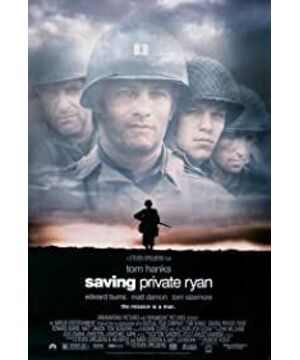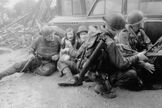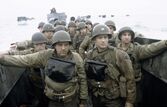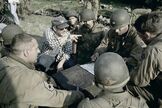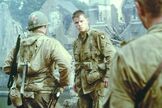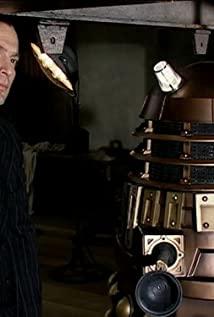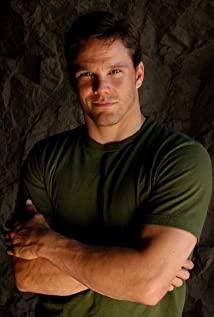1. War is the entertainment of the emperor, but at the cost of each fresh life.
For war, the leaders who initiated the war for political and economic rights and interests, these are the products of human civilization. Life is the foundation of human civilization, but it is the victim of war. This contrast makes us think. Anti-war is the mindset that most people hold, and so do I, and war will only bring tragedies like the Ryan family. Three brothers were killed, and other families had to suffer the pain of shattering in order to save the youngest brother. On the other hand, on the battlefield, the soldiers killed are people who have never met or know each other. If the two do not meet on the battlefield, they may even become friends in love, but it is the different uniforms that make people meet with life and death. Bet, fight to the death. More cruel than the killings they have never met is that the two were friends or even close relatives, just because they were in different camps and killed each other... Anti-war themed artworks emerge in an endless stream, and this movie is more or less It also shows the anti-war sentiment, which can be seen from the setting of the tragic background, but it is not the final theme after all, so I won't repeat it here.
2. The war also likes to eat fine food. He takes away the good people and leaves the bad ones.
Captain Miller's death was tragic, but in a sense he killed himself. The first is the choice of attacking heavy machine guns. As an officer, Captain Miller, on the grounds that the real goal is to win the war, chose to attack the heavy machine gun positions to avoid friendly casualties. In this attack, Medic Wade was killed. Leaving aside the right and wrong of this attack (different people, different opinions support different opinions, I think it is more wise to attack small to save the big. According to Captain Miller, every time a comrade is sacrificed, he will think that if he does not sacrifice, More people will die as an excuse for consolation.) The attitude towards the captives after this is also a great contradiction. In the process of watching this film, I also thought it was inhumane to kill him. After seeing the captain let him go, I felt comfortable. A foreshadowing at that time made my heart float, but I didn’t expect that in the end, this foreshadowing would be successful. Really, became Captain Miller's greatest tragedy. The German soldier who let him go became the shooter of the bullet that caused the most fatal injury to him. Seeing this scene made me realize that sympathy for the enemy in war is cruelty to oneself, and although it may seem inhuman, this is war.
3. War reveals courage beneath cowardice.
Corporal Urban is probably the most authentic representation of the common man on the battlefield. He expresses his reverence for war with an act of command-enforcement accompanied by fear, but at the real critical moment, he still fears, fears brutality, fears death. In the final battle of defending the bridge, he needed to supply the machine gun with ammunition, but until the machine gun stronghold was wiped out, he failed to send the ammunition. Finally, when his comrades were fighting the enemy hand-to-hand, he heard the movement, but fear prevented him from helping He got his comrade-in-arms, so that his comrade-in-arms finally died tragically by the enemy's sword. When I saw this clip, I felt angry, sad and angry about his fear and timidity. But if you really reflect on yourself, at that time, you may not even have the courage to go up the stairs after walking up the stairs. But with other battle-hardened comrades, he might successfully save his comrades. Why? That is "war reveals courage under cowardice". Of course, Corporal Urban finally captured a group of enemy troops by himself, and killed the German soldiers who were released under his persuasion but killed his benefactor. This is what Corporal Urban was uncovered in the war. Courage in cowardice.
4. The punishment of war is the same for the victim and the victim.
This is not obvious in the film, but it is indeed one of the biggest effects of war on soldiers. Imagine that after the war, those who survived will receive a psychological treatment for post-war psychological reconstruction. For the survivors in the war zone, they have witnessed many lives and deaths, and the pain and self-blame for the death of their comrades (similar to Rui’s death). When En finally decided not to retreat, he thought he had no right to abandon his comrade-in-arms to leave early) The guilt and incomprehension for the people he killed and the family he destroyed, and the sadness and sympathy for the innocent deaths that he had witnessed. A series of ideological punishments are the same for the perpetrator and the victim, and we cannot say that these mistakes need to be borne by them, but this is war, and this is what people in the war zone have to experience.
View more about Saving Private Ryan reviews


